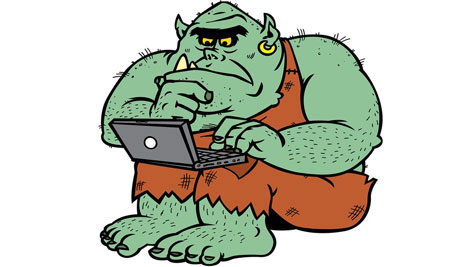
Who would cross the bridge of death must answer me these answers three, ‘ere the other side he see:
What is your name?
What is your quest?
What is the airspeed velocity of an unladen swallow?
No, no, no—not that kind of troll.
 Today, CBC News reported that the Crown Prosecution Service in the U.K. announced that they are working towards updating their guidelines to reflect the ever-too-real threat of online trolls and cyber bullying. Focusing on online impersonation, new laws could stipulate charges for those who use fake profiles to defame, humiliate, and harass other individuals.
Today, CBC News reported that the Crown Prosecution Service in the U.K. announced that they are working towards updating their guidelines to reflect the ever-too-real threat of online trolls and cyber bullying. Focusing on online impersonation, new laws could stipulate charges for those who use fake profiles to defame, humiliate, and harass other individuals.
While the definition (and negativity) of “trolling” can be debated, what cannot is the current threat arising from such social media impersonation. With so much of our personal lives online, anyone can create a fake account on popular social media sites—such as Twitter, Facebook, and Instagram—using the plethora of photos available on such sites already. Then, when the fake account is used to defame, humiliate, and harass, it becomes like a Star Trek episode where friends and family have to try and have to decide which is the real Kirk account and which is the fake Kirk account.
And while this post is lighthearted in tone, the affect that online impersonation can have on individuals is severe. The U.K. is working towards updating their laws, and although there are no federal laws currently in the U.S., nine states do have online impersonation laws on the books.
I’m sure everyone agrees that we should get rid of the fake accounts intent on harming people, but spare me the ones that are just in it for the fun:
Mattress with timed sideways automatic incline so one can literally roll out of bed. pic.twitter.com/oAVwkR7lHU
— Bored Elon Musk (@BoredElonMusk) February 1, 2014
What do you think? Have you ever been impersonated online? How did you handle it?
Should there be laws against online impersonation? If so, to what extent?
